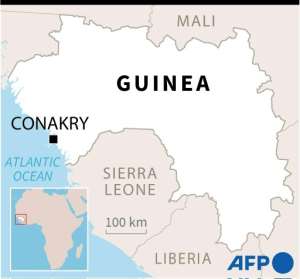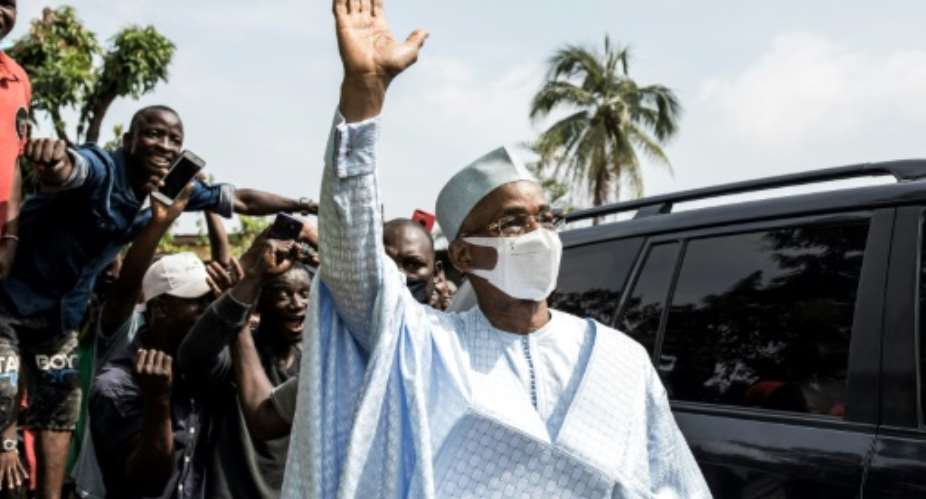International mediators urged Guinea to lift a blockade of the home of its main opposition leader Tuesday, while the EU said there were doubts about the credibility of last week's presidential election.
President Alpha Conde, 82, won the hotly contested October 18 election, according to official results announced Saturday, setting the stage for a controversial third term in office.
But opposition leader Cellou Dalein Diallo, 68, had already claimed victory, citing data his activists gathered at individual polling stations.
The move triggered lethal clashes between opposition supporters and security forces across the West African nation of 13 million people.
Twenty-one people died in the post-election violence, the government said, although the opposition put the number of dead at 27.
International envoys -- including ECOWAS Commission President Jean-Claude Kassi Brou and the UN special representative to West Africa, Mohamed Ibn Chambas -- landed in Guinea on Sunday to mediate the dispute.
In a statement on Tuesday, the representatives said they had come to "lower sociopolitical tensions" after the disputed election.
 Guinea. By Gillian HANDYSIDE (AFP)
Guinea. By Gillian HANDYSIDE (AFP)
They added that they "regretted the loss of human life," urged Guinea to investigate and bring the perpetrators to justice, and called on all parties to engage in dialogue.
The European Union's foreign policy chief Josep Borrell on Tuesday said he supported the mission, and pointed out that doubts over the election's credibility remain.
Alluding to Diallo, he said that "all actors" must be allowed freedom of movement and expression.
"It is also important that the means of communication, in particular access to the Internet, be guaranteed in all circumstances," Borrell added.
Contested third term
Internet connection was severely disrupted during the clashes last week. Web-monitoring groups have accused the government of being responsible.
A spokeswoman for Orange Guinea said the network's connection to the internet had been "cut at the point of access".
However internet services appeared to have to returned to normal on Tuesday, AFP journalists reported.
Much of the turbulence in the poor nation of 13 million people centres on the third presidential term for Alpha Conde, whom opponents accuse of drifting into authoritarianism.
He pushed through a new constitution in March which he argued would modernise the country.
But it also allowed him to bypass the normal two-term limit for presidents, arguing that the counter had been reset to zero.
That decision provoked mass protests from October 2019, in which security forces killed dozens of people.
Conde, who spent decades in exile as an opposition activist, became the former French colony's first democratically-elected leader in 2010, and won re-election in 2015.
Critics accuse him of veering into authoritarianism, however, and of stubbornly refusing to investigate killings committed by his forces.
Diallo was formerly a prime minister under authoritarian leader Lansana Conte, and has unsuccessfully challenged Conde in each election the president has contested.
Guinea's politics are mainly drawn along ethnic lines: The president's base is among the ethnic Malinke community while Diallo has strong backing among the Fulani people, also known as Peul.





 Lay KPMG audit report on SML-GRA contract before Parliament – Isaac Adongo tells...
Lay KPMG audit report on SML-GRA contract before Parliament – Isaac Adongo tells...
 Supervisor remanded for stabbing businessman with broken bottle and screwdriver
Supervisor remanded for stabbing businessman with broken bottle and screwdriver
 NDC watching EC and NPP closely on Returning Officer recruitment — Omane Boamah
NDC watching EC and NPP closely on Returning Officer recruitment — Omane Boamah
 Your decision to contest for president again is pathetic – Annoh-Dompreh blasts ...
Your decision to contest for president again is pathetic – Annoh-Dompreh blasts ...
 Election 2024: Security agencies ready to keep peace and secure the country — IG...
Election 2024: Security agencies ready to keep peace and secure the country — IG...
 People no longer place value in public basic schools; new uniforms, painting wil...
People no longer place value in public basic schools; new uniforms, painting wil...
 'Comedian' Paul Adom Otchere needs help – Sulemana Braimah
'Comedian' Paul Adom Otchere needs help – Sulemana Braimah
 Ejisu by-election: Only 33% of voters can be swayed by inducement — Global InfoA...
Ejisu by-election: Only 33% of voters can be swayed by inducement — Global InfoA...
 Minority will expose the beneficial owners of SML, recover funds paid to company...
Minority will expose the beneficial owners of SML, recover funds paid to company...
 Prof. Opoku-Agyemang has ‘decapitated’ the NPP’s strategies; don’t take them ser...
Prof. Opoku-Agyemang has ‘decapitated’ the NPP’s strategies; don’t take them ser...
